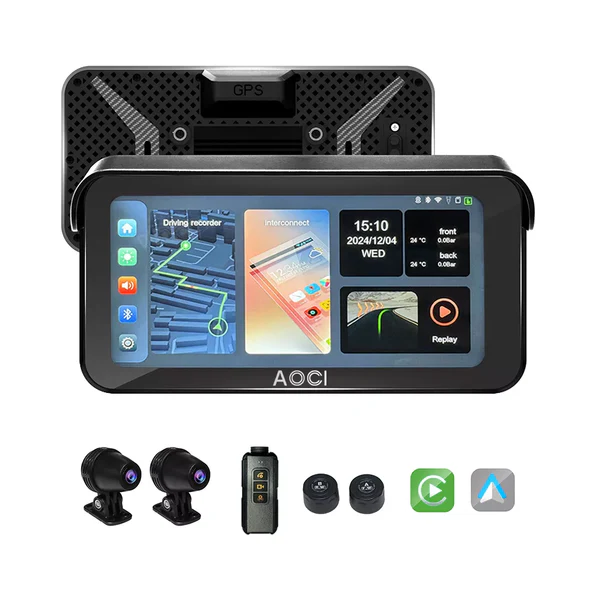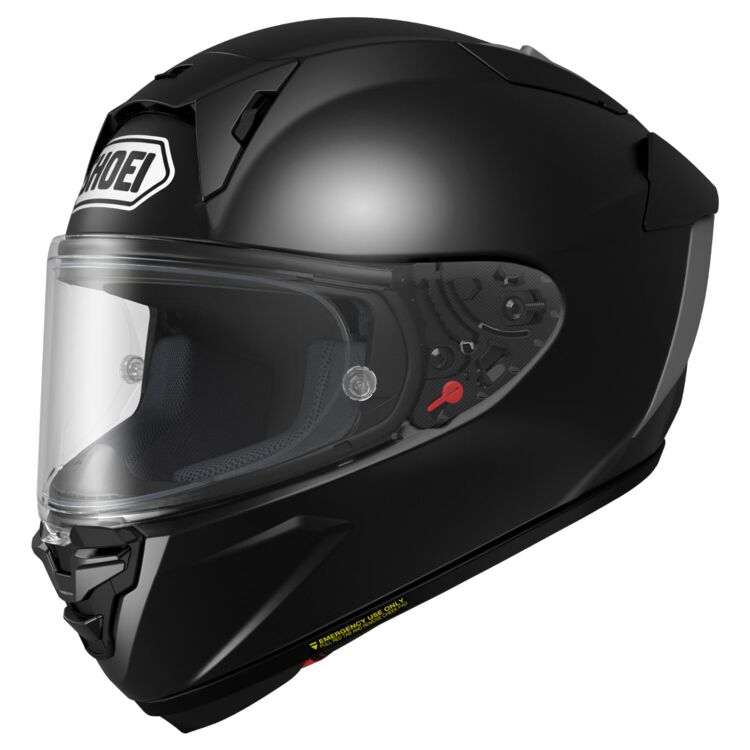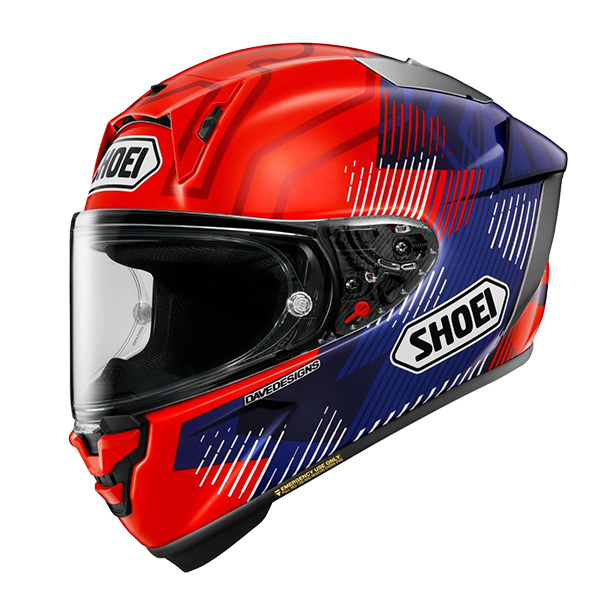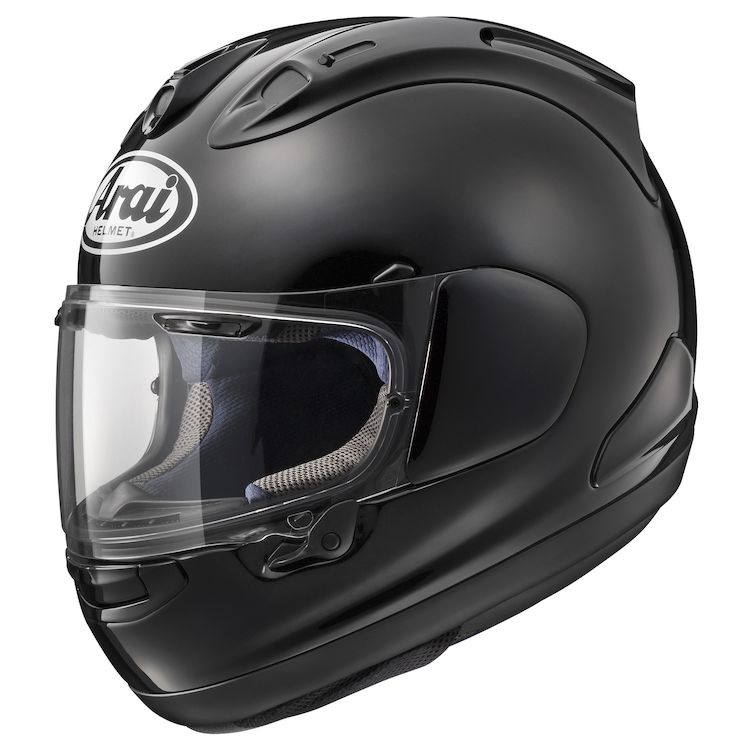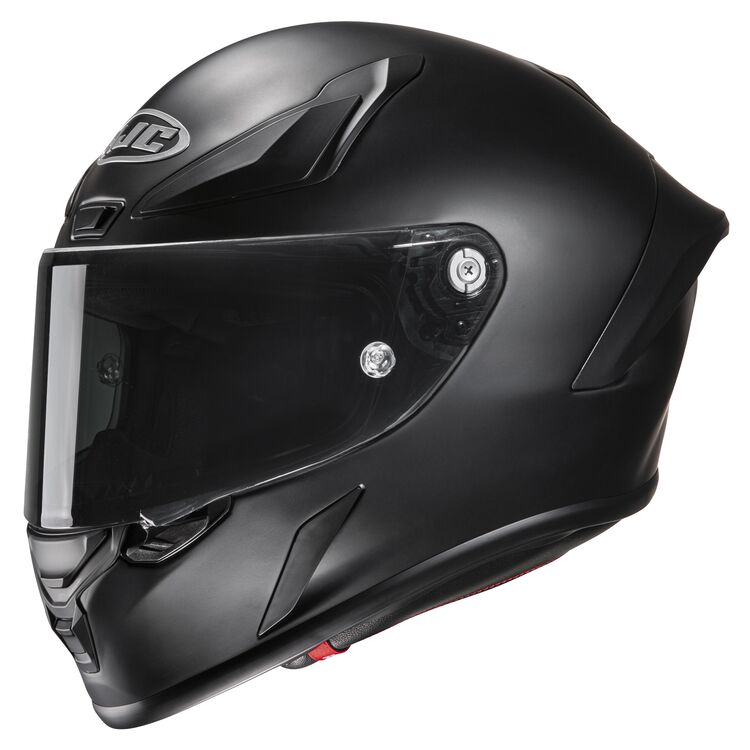The post Motorcycle Smart Screen Review: Aoocci C9 Max – Easy Install & CarPlay first appeared on It's Better On The Road.
]]>- Phone Safety First: Ditch the phone mounts! Seriously, those vibrating, precarious contraptions are accidents waiting to happen for your precious, data-packed smartphone. We’re talking about a dedicated screen that keeps your phone safe and sound in your pocket.
- Integrated Awesomeness: This isn’t just a screen; it’s a smart hub. Think navigation, music, tire pressure monitoring, and get this – built-in front and rear cameras! It’s like strapping a digital Swiss Army knife to your handlebars.
- Wiring Made Easy: No more wrestling with your bike’s wiring harness and questionable splicing. We’re talking plug-and-play simplicity thanks to some clever tech that’ll have you powered up in minutes, not hours.
Ready to see what all the fuss is about? Let’s get into it!
If you’d rather watch this review, here’s my original video on the topic:
Unboxing the Aoocci C9 Max Smart Screen: First Impressions
Right then, let’s get down to business. You know me, always tinkering in the garage, and today is no different. Fresh off the back of getting all the mud off the 690 and 950 after that off-road escapade (that’s a story for another time!), we’re onto the next bit of kit. And this, my friends, is something I’ve been itching to try.
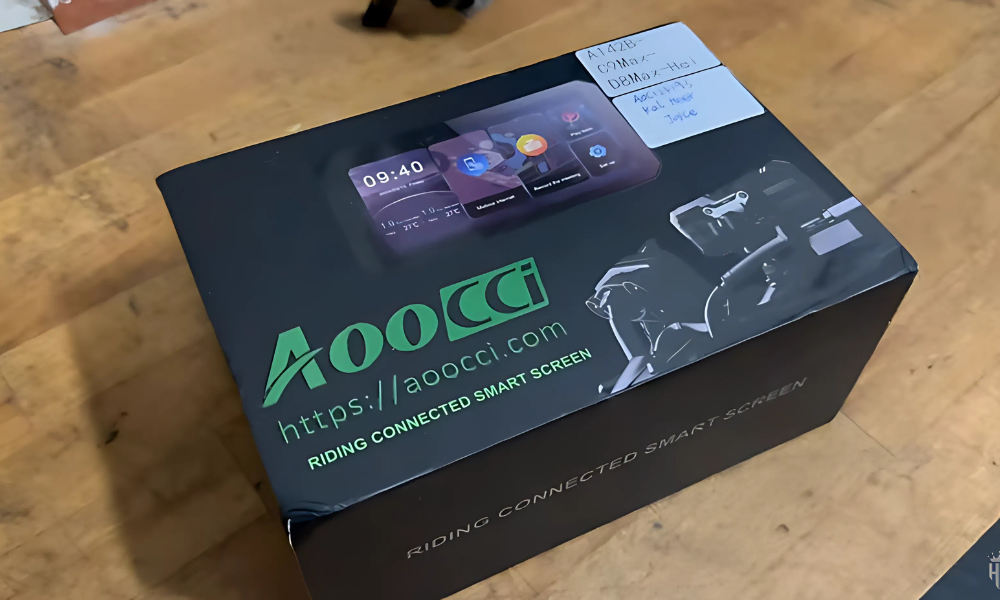
Behold! The Aoocci C9 Max connected smart screen. Yeah, one of those screens. Now, I’ve been around the block when it comes to mounting stuff on bikes. I’ve used the SP Connect, Quad Lock, even those dodgy Amazon clamps that feel like they’re about to fling your phone into the next county at any moment. And let me tell you, my phone is basically my life. Finances, banking, kids’ school stuff, the whole shebang. The last thing I want to do is wreck it bouncing around on the handlebars.
I’ve always been intrigued by these dedicated smart screens. I saw Lamb Chop’s review of something similar, and if he rates it, it’s definitely worth a look. So, I thought, “Right, let’s give this a blast.”
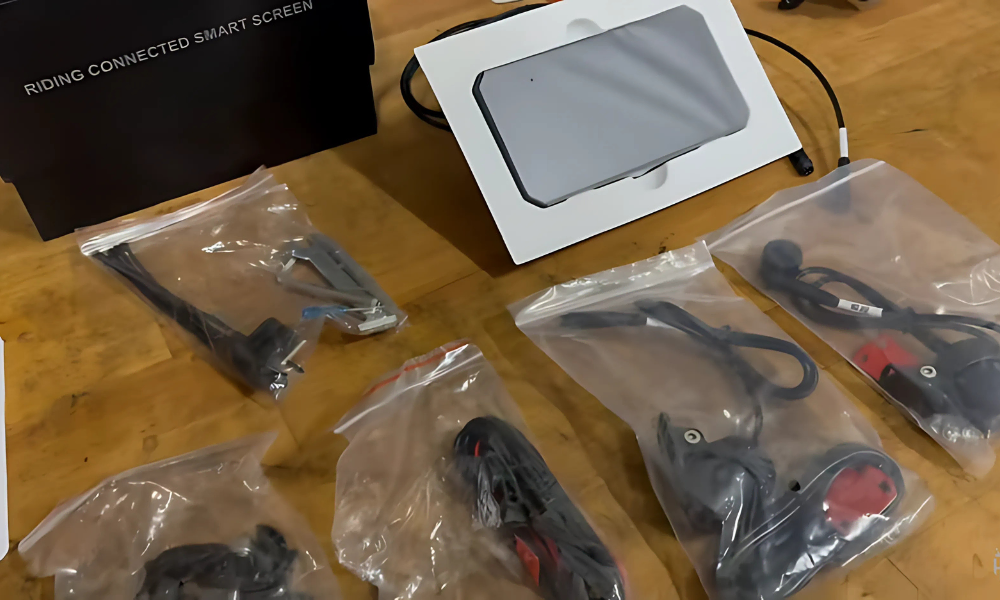
Let’s crack this box open and see what we’ve got. This is the C9 Max model, and blimey, it’s got a massive screen! Proper iPhone/Samsung size. Looks good straight out of the box. Digging deeper, we’ve got a front-facing camera, a rear-facing camera, tire pressure sensors, power cables, clamps for fitting it to the bike, and a bag of accessories. Not bad, not bad at all.
Yo: The Aoocci C9 Max Smart Screen is currently out of stock. However, we recommend the Aoocci C6 Smart Screen as a strong alternative. The C6 shares many of the same core features and delivers a very similar user experience, making it a reliable substitute until the C9 Max is available again.
Ultimate smart riding companion with dual cameras, GPS, and anti-theft security.
- Crisp 1080P front and rear recording with HDR and low-light support
- Wireless CarPlay and Android Auto for seamless connectivity
- Built-in GPS with route tracking and tire pressure monitoring
- Wired remote may feel bulky for riders preferring a fully wireless setup
Mounting and Initial Setup: Where Does This Thing Go?
Okay, so the big question is, where does this all go on the bike? Seat off, battery’s exposed at the rear… For the rear camera, I’m thinking just sticking it on the underside of the license plate bracket. Shouldn’t be too intrusive there. Now, the front camera… I think I’ll stick it right on the front fairing, with one of the included adhesive mounts. Just have it pointing forward.
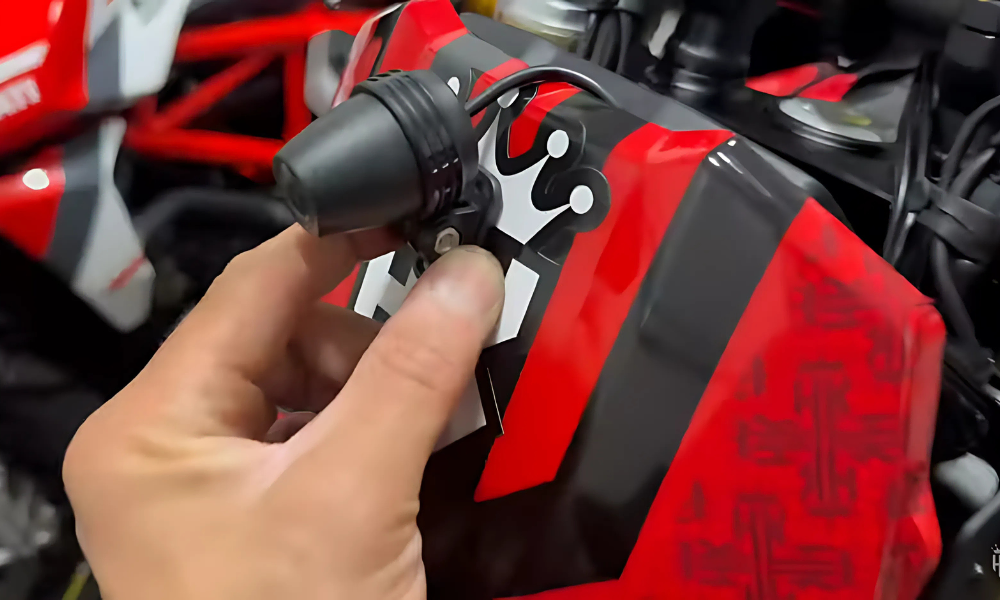
For the main screen unit, I reckon mounting it just above the dash, right in the center, is the way to go. Screen facing up like this. Then, it’s just a case of figuring out the wiring. Looks like I’ll need to take some fairings off and get creative with cable routing.
Right, quick mock-up. I’ve just clamped the screen onto the handlebar clamp for now, just to get a feel for positioning. Sat on the bike, looking forward… yeah, I can still see the dash, and the screen is nicely in view. Not too bad at all.
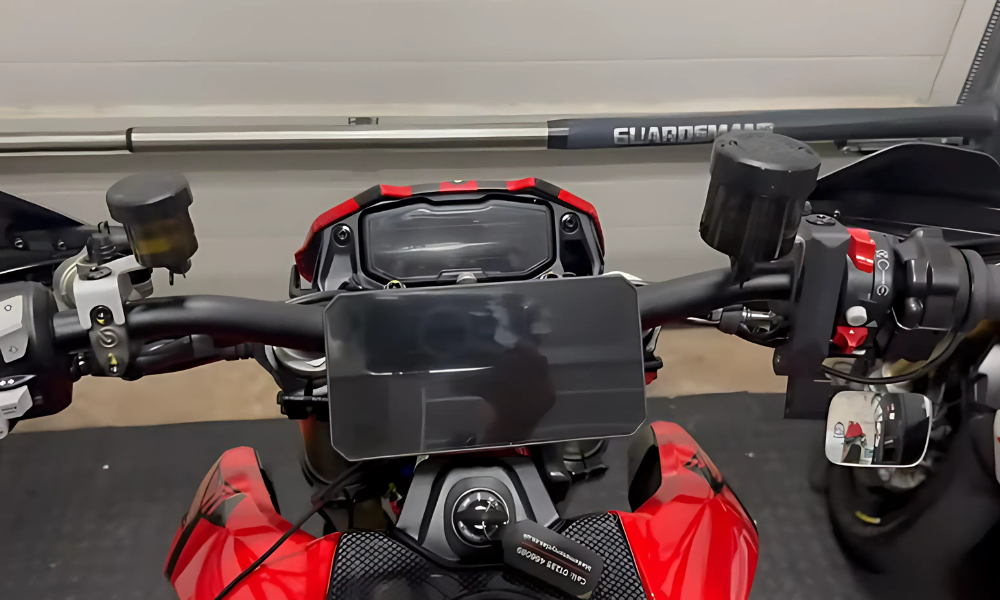
Wiring-wise, it seems straightforward enough. One wire for the front camera, one for the rear, and then power. I’ve run the wires down through this gap here, behind the instrument cluster. Just took a couple of screws out, moved the panel forward a bit, and tucked the wires down. Seems tidy enough for now.
The HeelTech Thunderbox: Wiring Made Easy
Now, to make life easier, I’ve ordered a HeelTech Thunderbox. This little beauty should save me a ton of faffing around with splicing wires. For power, I’m just going to plug into the Thunderbox, then that plugs into the battery. Simple as that. Then, stick the rear camera on, and we’ll see if this whole thing powers up.

When the bike is off, it’s got a flashing green light. That means it’s not powered on yet. Start the bike…
…you should see it start flashing really fast, and then solid green light. Powered on. Now, when I turn the bike off, that green light should go off, start flashing again, and then cut the power completely. Saves draining the battery. Brilliant bit of kit.
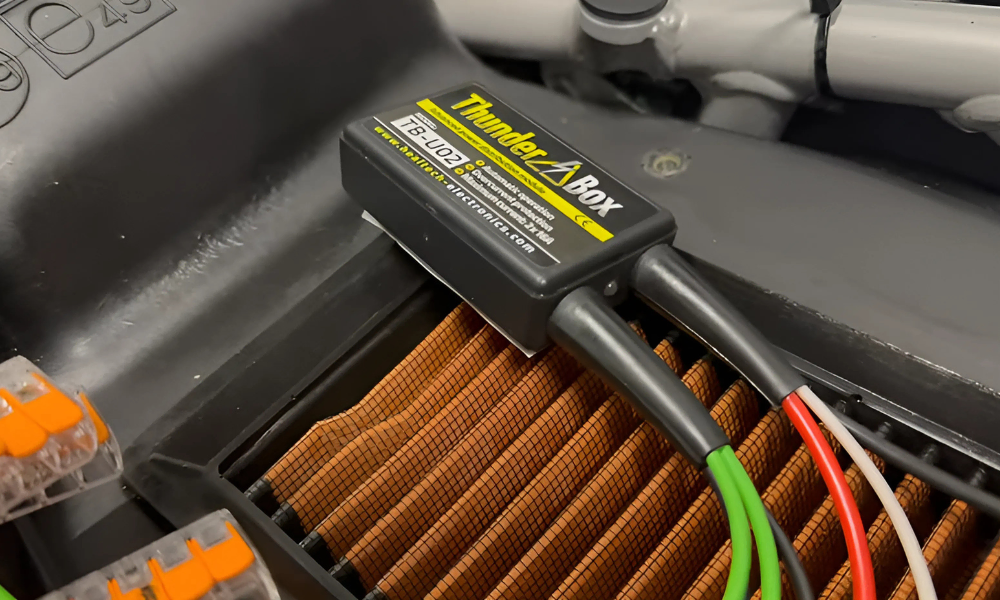
For the rear camera, I’m just going to leave it loose for now, but that’s going to sit nicely under the license plate, facing backwards.
Apple CarPlay and Camera Test: Does It Actually Work?
Right, moment of truth. Let’s see if Apple CarPlay works. Bluetooth… straight to it! “Do you want to use Apple CarPlay?” Bloody job done! Simple.
Let’s check out the cameras. Tap the screen… Yep, that’s the front one. And… rear camera! Boom! Got both working.
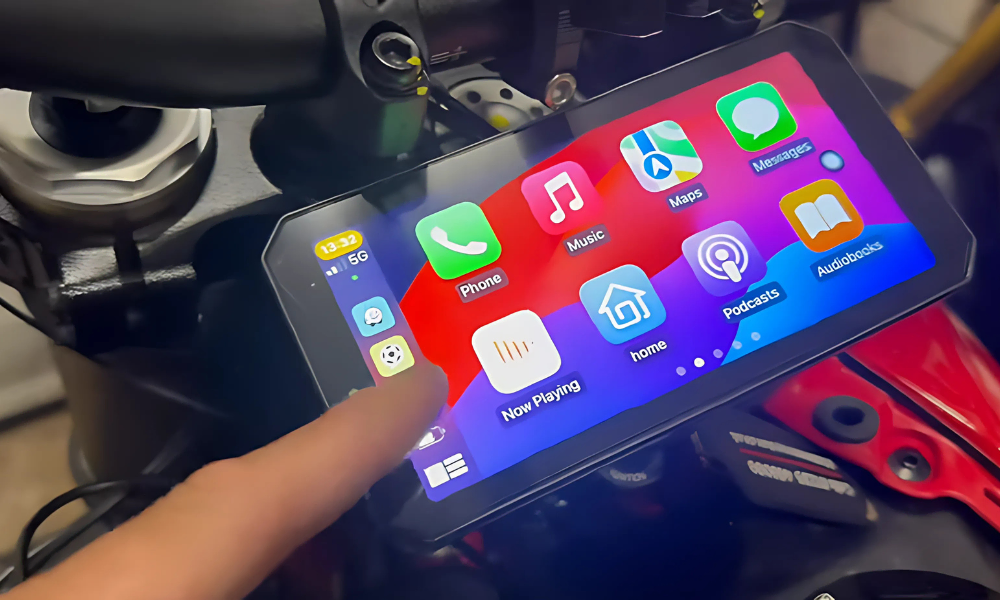
Quick test of the whole system now. Device is on the bike, powered up. Tire pressure sensors are working – front showing 34 PSI, rear 32 PSI. Temperature reading too, 11 degrees – nippy out here today!
Tap the screen… camera view! Rear-facing camera is working perfectly. That’s awesome. I can even see the car behind me in the garage. It’s like having a digital rear-view mirror! Swipe across… front camera view. Not bad, not bad at all. A bit dark and gloomy in here, but the view is decent. Not sure about running both front and rear views on screen all the time – looks a bit mad. But for now, let’s just get back to the home screen.

Now on my ride I can pull up Google Maps, get it right on that big screen. Perfect for navigation. Can also still listen to the radio, and pull up the rearview camera.
And getting to that camera doesn’t take a whole bunch of fiddling on the touchscreen… just find the physical button here on the side… press that… straight to the cameras! Boom! Rear-view camera at a touch. Awesome! That’s going to be so handy. Little rear-view camera on the bike! Woo!
Navigation and music are the main things I wanted this for. Being able to see maps clearly and listen to music or podcasts while riding. Screen is nice and bright, even in the garage light. Maps are working perfectly. Position of the screen feels spot on too. Just there, nicely in view, but not blocking the main dash.
First Ride and Verdict: Works a Treat!
Right then, time for a quick spin. Just a little test ride to see how this thing performs on the road. Let’s get the lid on and get going.
Out on the road… First impressions? This little device works the business, mate! Works the absolute business!
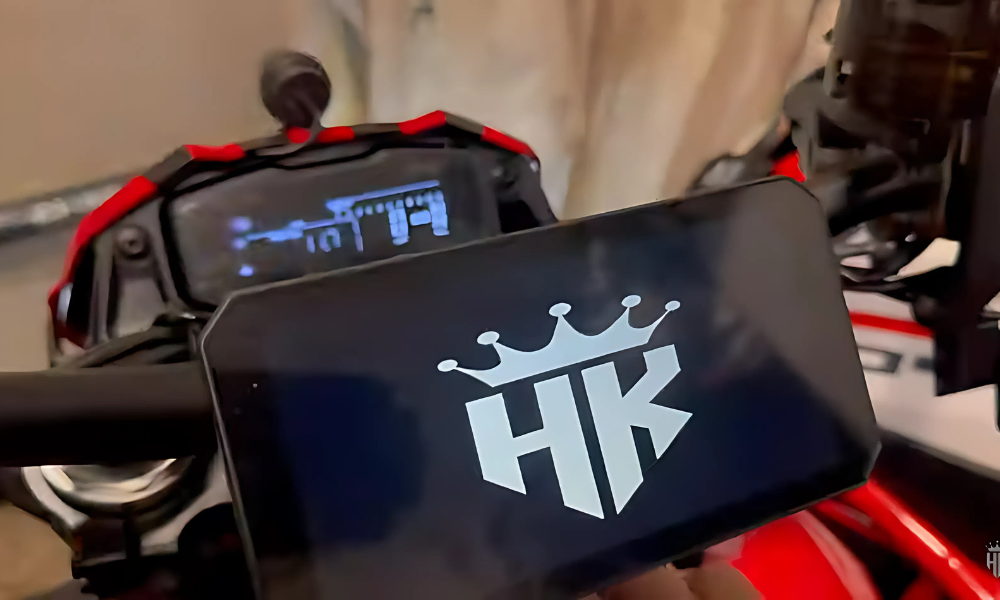
(Bike sputters and pops) Oh, fuel light’s on! Blimey, running on fumes! Little pops and bangs from the exhaust though, sounding good!
This little test ride is cool. And this little device is awesome, man. Perfect! This is exactly what I wanted.
Get Yours
So there you have it. My first impressions of the Aoocci C9 Max smart screen. This little device is awesome. If you fancy one of these for yourself, pick it up at the links below.
If you’re thinking about getting one, just have a go, man. Have a go! Get it! You will not be disappointed.
Ultimate smart riding companion with dual cameras, GPS, and anti-theft security.
- Crisp 1080P front and rear recording with HDR and low-light support
- Wireless CarPlay and Android Auto for seamless connectivity
- Built-in GPS with route tracking and tire pressure monitoring
- Wired remote may feel bulky for riders preferring a fully wireless setup
The post Motorcycle Smart Screen Review: Aoocci C9 Max – Easy Install & CarPlay first appeared on It's Better On The Road.
]]>The post Shoei X-Spirit III Review: MotoGP Tech for Track Day Warriors first appeared on It's Better On The Road.
]]>When you’re hitting apexes on a track, you don’t have an ounce of focus to spend on anything but hitting that corner. No room for distractions.
The Shoei X-Spirit III is a lid that completely gets out of your way and let’s you do what you do best: speed.
Stick with me, and you’ll understand exactly why this helmet commands its price tag and whether it’s the missing piece for your high-performance riding puzzle.
Now, let me throw a few things out there that might sound a bit odd at first.
Rather watch this review? Here’s our full breakdown in video form:
This helmet, designed with input from guys like Marc Marquez, isn’t necessarily the absolute quietest lid you can buy, and honestly? For the track, that might be a hidden advantage.
Also, while everyone chases the lightest helmet, the X-Spirit III proves that stability often trumps shedding every last gram.
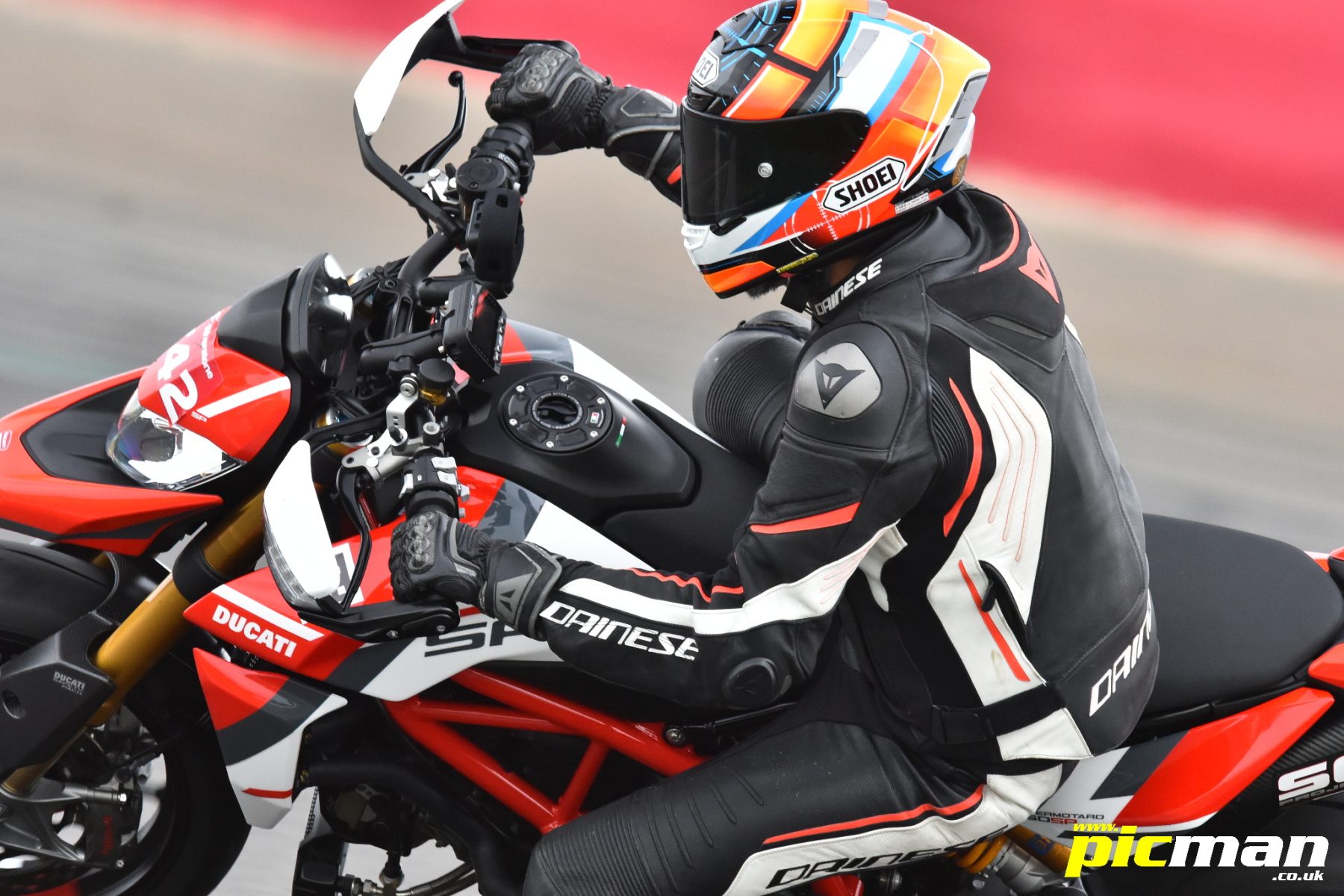
And yes, the price is steep, but investing less might actually cost you more in the long run – in terms of fatigue, confidence, and lap times.
Tip: The newer version of the X-Spirit III is named the X-SPR Pro in the UK market, and in the USA it’s sold as the Shoei X-15.
My Journey to the X-Spirit III
I’m a supermoto guy with two Ducatis in the garage, and I ride pretty much every day: whether it’s navigating city traffic, carving up mountain roads, or hitting the local track for some much-needed speed therapy.

Over the years, I’ve gone through more helmets than I can count. From budget-friendly options early on (we all start somewhere, right?) to mid-range lids and eventually, the top-tier stuff. I’ve worn Arais, AGVs, HJCs, you name it. Some were comfy but felt like sails at speed. Others were light but noisy. Finding that perfect blend of track-ready performance and everyday usability felt like a constant quest.
The X-Spirit III balances these well.
After taking it around town and on the track, here’s what I can say about this lid.
What I Absolutely Love
This helmet gets so much right, especially for its intended audience.
Looks and Finish
Let’s face it, we want our gear to look good. Shoei nails this. The X-Spirit III has an aggressive, purposeful stance. The variety of graphics, from the stunning Marquez replicas to more subtle designs, means there’s likely a look that resonates with your bike, leathers, or personal style.

The paint quality and finish are top-notch, holding up well to the inevitable bugs and minor road debris. It just looks like a premium piece of kit, because it is.
Aerodynamic Stability
This is the headliner. The work Shoei put into the wind tunnel testing, the rear stabilizer flaps (yes, you can swap between two types – a wider one for straight-line stability and a narrower one for more head movement), and the overall shape pays off massively.
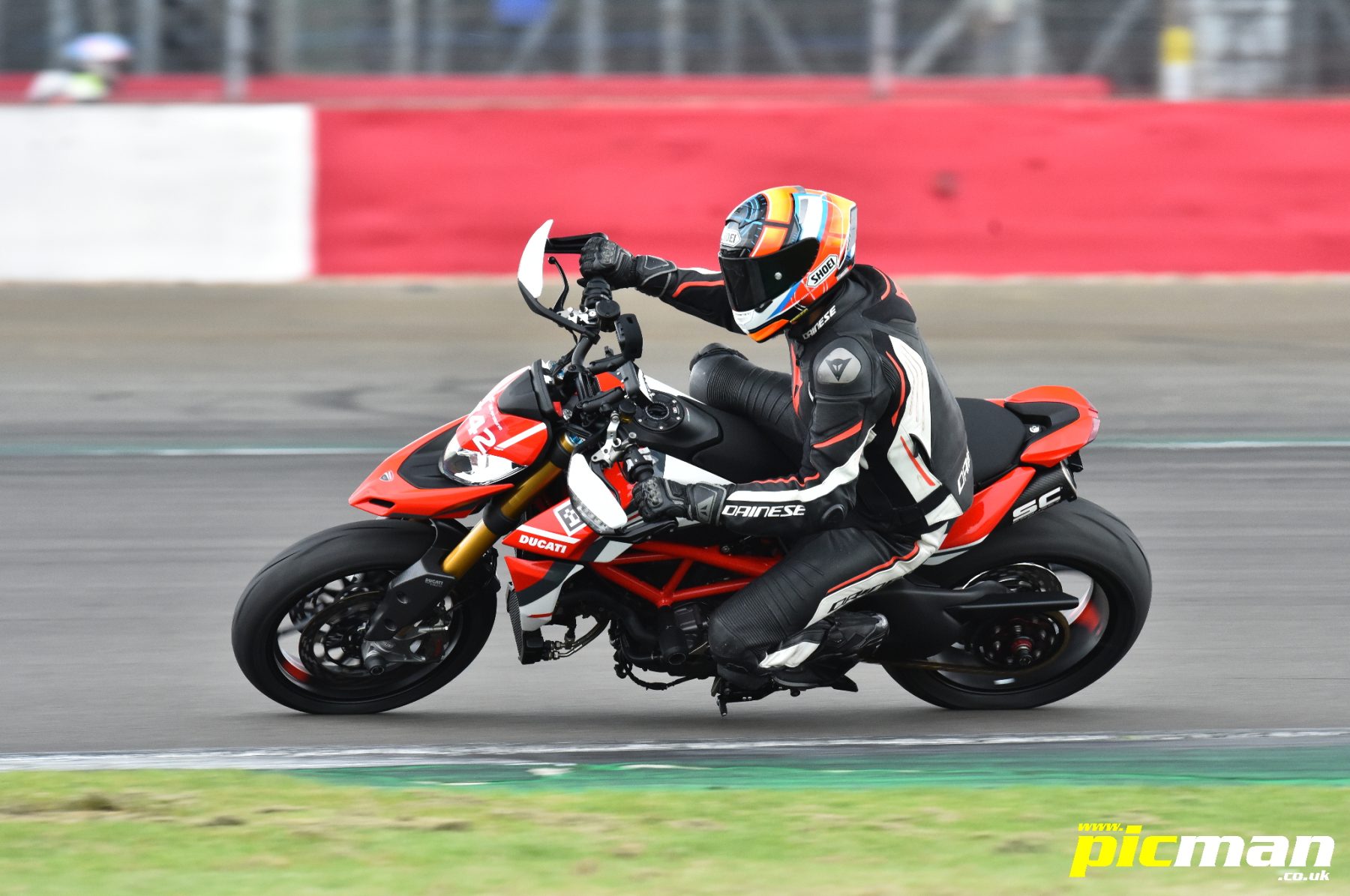
At high speeds, particularly on faired sportbikes, the reduction in buffeting and lift compared to many other helmets is substantial. This translates directly to less neck fatigue and, more importantly, increased focus and confidence. You’re fighting the track, not your helmet.
Customizable Fit
This is huge. No two heads are exactly alike. Shoei offers different thickness cheek pads and center pads (the X-Spirit III system actually has six individually exchangeable center pad sections). This allows you to tailor the fit precisely to your head shape.
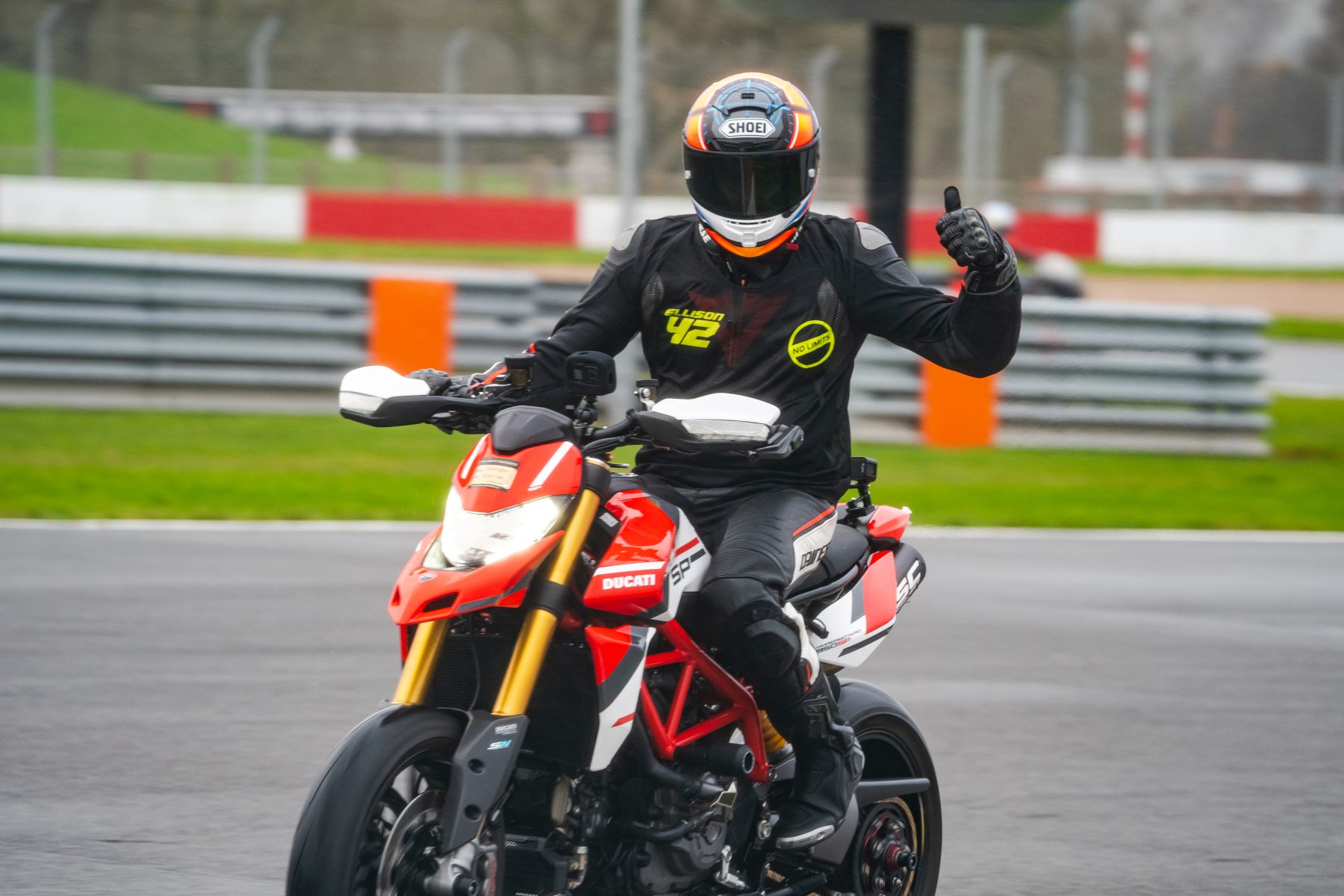
It might take a bit of experimenting (or a fitting session at a good dealer), but achieving that perfect, snug-but-not-painful fit makes a world of difference in comfort and safety. That initial tightness I mentioned? It breaks in, but being able to fine-tune it accelerates the process and ensures long-term comfort.
Track-Focused Vision
The CWR-F flat shield combined with the ability to adjust the liner’s angle (rotating it slightly forward for a better view in a tuck) is brilliant. Peripheral vision is excellent, crucial for spotting markers and other riders on track. The shield itself is optically superb, distortion-free, and the double lock mechanism ensures it stays shut, even at serious speeds. Plus, the Pinlock EVO insert covers nearly the entire viewport, banishing fog effectively.
Tip: The newer version of the X-Spirit III is named the X-SPR Pro in the UK market, and in the USA it’s sold as the Shoei X-15.
The Not-So-Perfect Bits (and Why They’re Okay)
No product is perfect, and the X-Spirit III has a few points worth considering.
The Price Tag
Okay, let’s get the big one out of the way. This helmet is expensive. There’s no sugar-coating it. It sits at the very top of the market price-wise. However (here’s the silver lining), you are paying for genuine MotoGP-derived technology, exceptional build quality, FIM homologation (on some models, check specifically), advanced aerodynamics, and a highly customizable fit.

Think of it as an investment in your safety, comfort, and performance. A cheaper helmet might save money upfront, but if it causes fatigue, limits focus, or needs replacing sooner, is it really cheaper?
For serious track riders or those who demand the best stability, the cost starts to make sense when weighed against the benefits. If the price is an absolute barrier, the HJC RPHA 1 offers FIM certification at a lower cost, albeit perhaps without the same level of refinement or aero development as the Shoei.
Initial Tightness & Break-In
This helmet is designed to be snug. Race fit means secure fit. When you first put it on, especially if you’re used to more relaxed touring helmets, it can feel quite tight, particularly around the cheeks. The silver lining is twofold: first, this ensures the helmet stays put during aggressive riding or, worse, in an impact.
Second, the high-quality padding does break in and conform to your head shape over time. Using the customizable pads can also alleviate specific pressure points. Patience and perhaps some fine-tuning with pads are key here.
Wind Noise (with Vents Open)
While the aerodynamics manage airflow around the helmet incredibly well, channeling air through it via the vents inevitably creates some noise. With all vents open on a hot day, especially on a naked bike or behind a short screen, the X-Spirit III is not whisper quiet. It’s not deafeningly loud like some budget lids, but you’ll hear the wind.

The silver lining here is that this is a direct trade-off for excellent ventilation. That airflow keeping you cool and focused on a scorching track day generates some noise.
Most track riders and many performance street riders wear earplugs anyway, which largely negates this issue. If maximum quietness is your absolute priority over aggressive aero and ventilation, a touring-focused helmet like the Shoei GT-Air III or Schuberth C5 might be a better fit, but you’ll sacrifice the X-Spirit III’s track credentials.
Need-to-Knows
Sizing: Shoei helmets generally run true to size, but given the customizable nature and the importance of a perfect fit for a race helmet, trying one on is highly recommended. Don’t just guess based on your old helmet brand. The head shape is generally considered intermediate oval.
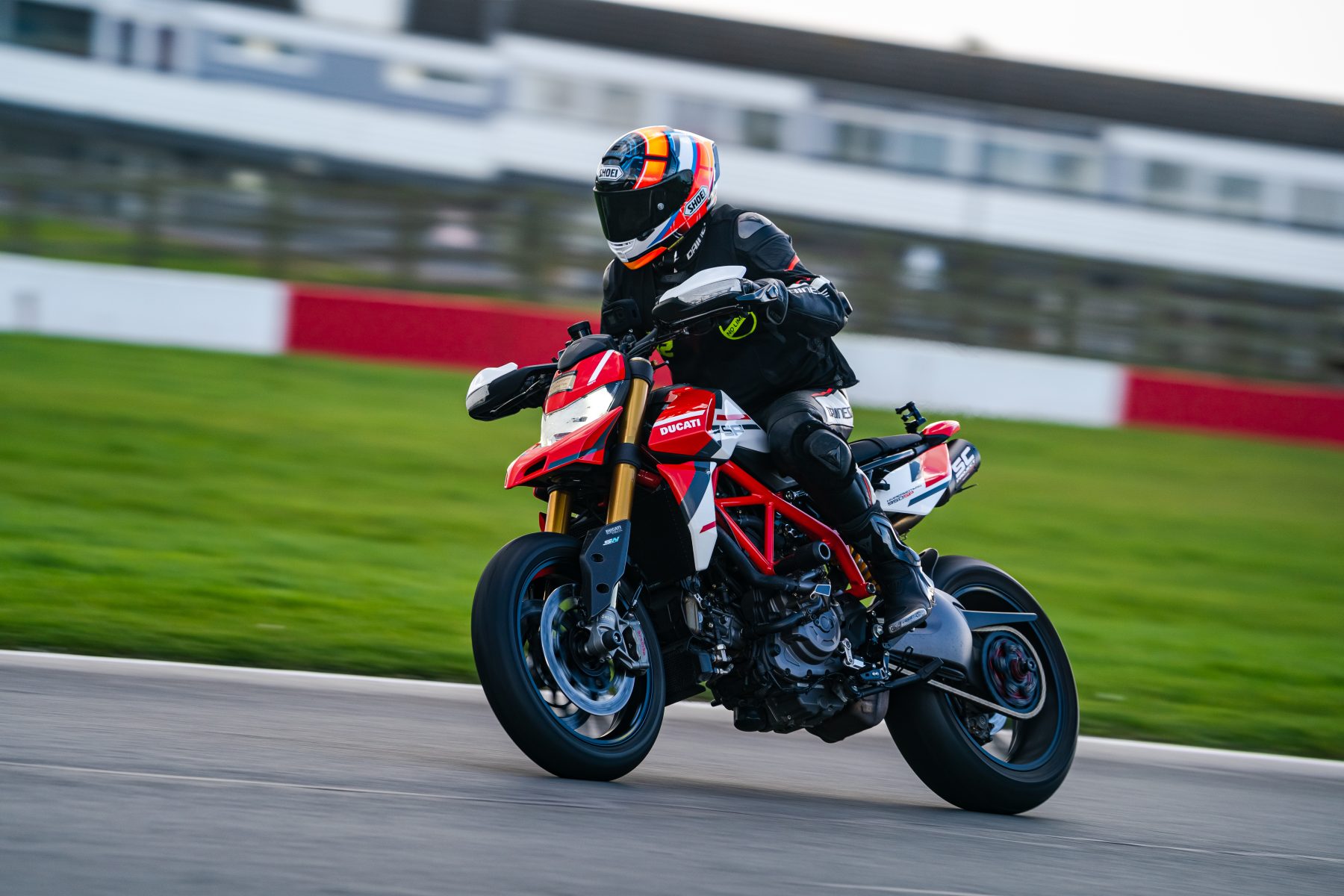
FIM Homologation: While developed directly from MotoGP tech, check the specific model and size for FIM homologation if that’s a requirement for your race series. Not all versions automatically carry it.
Adjustable Liner: Don’t overlook this feature! Taking the time to switch it to the “race” position (tilting it forward 4 degrees) genuinely improves vision when tucked. It’s a simple adjustment but makes a noticeable difference.

E.Q.R.S.: The Emergency Quick Release System allows emergency responders to remove the cheek pads easily, potentially reducing neck strain when taking the helmet off after an accident. It’s a safety feature you hope never to use, but it’s reassuring to know it’s there. Just remember not to use the red E.Q.R.S. tabs for routine cleaning!
MotoGP Pedigree: Knowing that riders like Marc Marquez (an 8-time World Champ!) rely on this helmet technology week-in, week-out adds a certain confidence. It’s developed and proven at the absolute highest level of the sport.
How It Stacks Up: The Competition
The X-Spirit III plays in the premier league. Here’s how it compares to its main rivals:
VS Arai Corsair-X
Often seen as the Shoei’s arch-nemesis. The Arai typically caters to a slightly rounder head shape compared to the Shoei’s intermediate oval. It’s renowned for its plush comfort and smooth, organic shell shape (R75 concept).
Ventilation is excellent, but its aero might feel slightly less aggressive or stable at extreme speeds compared to the X-Spirit III’s dedicated wings and stabilizers. Build quality is impeccable on both.
Choosing between them often comes down to head shape, comfort preference, and whether you prioritize ultimate stability (Shoei) or plushness and Arai’s specific safety philosophy (Arai).
Top-tier racing helmet with premium safety, ventilation, and comfort.
- Superior impact protection with PB SNC2 shell
- Excellent ventilation with adjustable diffuser system
- Wide, clear view with Pinlock-ready VAS shield
- High price point compared to competitors
VS AGV Pista GP RR
This is the hardcore, uncompromising Italian track weapon. Often lighter than the Shoei and Arai, it boasts aggressive MotoGP styling and fantastic ventilation. However, it generally fits a narrower head shape, can be significantly louder, and offers less versatility for road riding.
It’s the choice for the MotoGP purist who wants the absolute closest thing to what Rossi or Bagnaia wear, prioritizing track performance above all else, including comfort and noise suppression.
The pinnacle of race helmet engineering, this lid is used to protect the heads of some of the most famous athletes in motorcycle history.
- 100% carbon fiber
- Secure visor lock system
- Pinlock included and tear-off ready
- Literally used in MotoGP
- Very expensive
- Not commuter-friendly
- High wind noise
VS HJC RPHA 1N
HJC burst onto the top-tier scene with this FIM-homologated helmet. It offers incredible value, packing in features and safety certification often found on much pricier lids. It’s a solid performer on track, reasonably light, and comes in various race replica graphics.
Where it might fall slightly short of the Shoei is in the ultimate levels of aerodynamic refinement, the feel of the interior materials, and the sheer breadth of fit customization options Shoei provides. It’s the smart choice for budget-conscious track riders or racers who need FIM approval without the absolute premium price.
MotoGP-level helmet with race-ready design, protection, and ventilation.
- FIM certified for top-tier impact protection
- Advanced ventilation keeps you cool under pressure
- Lightweight carbon shell with moisture-wicking liner
- Limited graphic and color options
The Final Verdict
So, after countless miles on road and track, what’s the takeaway?
The Shoei X-Spirit III is an exceptional piece of equipment. The combination of stunning looks, world-class aerodynamic stability, fantastic track visibility, and that brilliant customizable fit system makes it a top contender for any serious sportbike or track rider. It inspires confidence when you’re pushing hard, reducing fatigue and allowing you to focus purely on your riding.
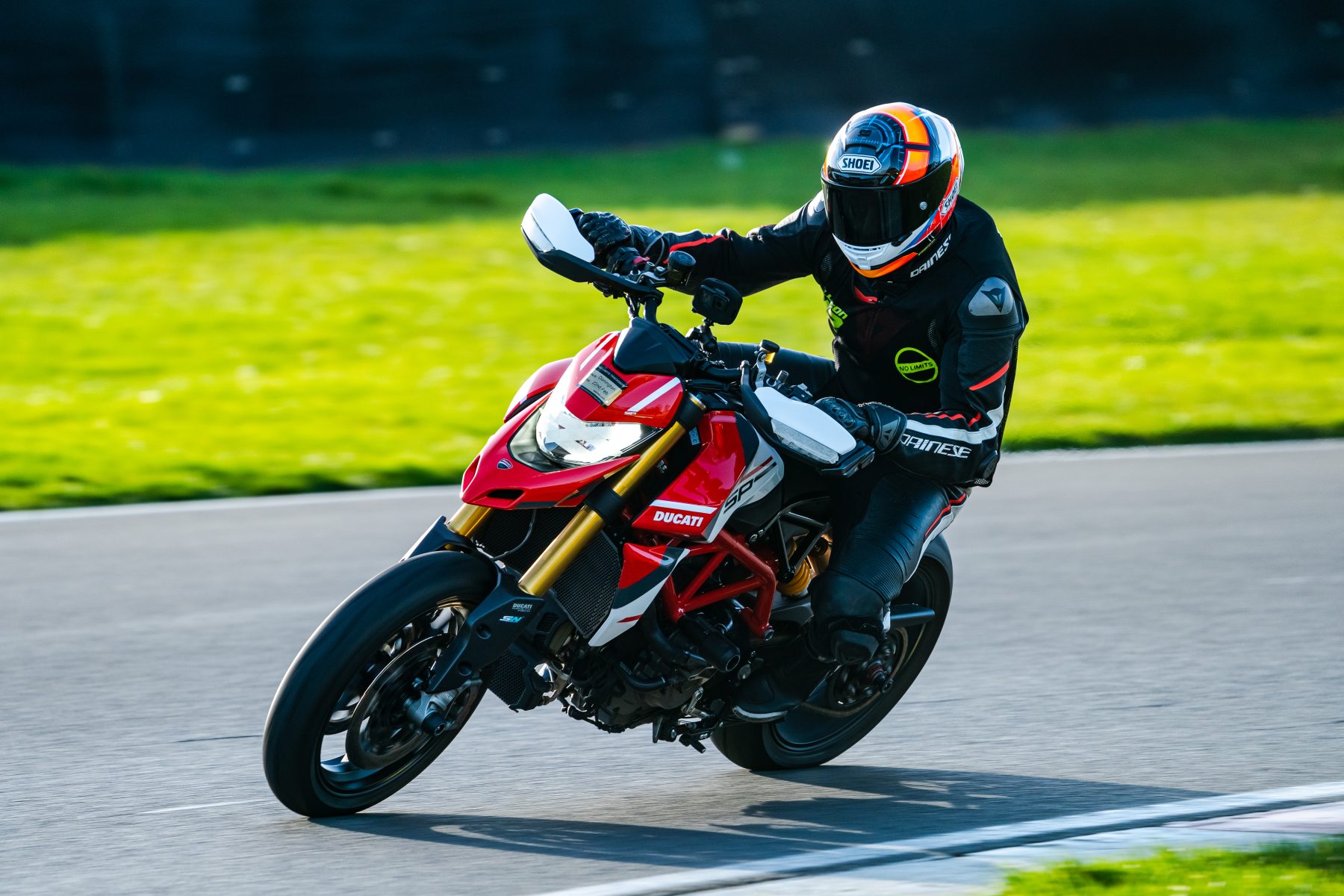
Yes, it’s expensive. Yes, it’s snug initially. And yes, you’ll want earplugs for maximum comfort. But these are calculated trade-offs for its incredible performance envelope.
This helmet is tailor-made for riders who spend significant time on track or demand the utmost stability during aggressive street riding on high-performance bikes. If you prioritize a plush, quiet touring experience or need an internal sun visor, this isn’t your helmet.
But if you want a helmet that feels like an extension of yourself when leaning into a 120mph corner, providing unwavering stability and a clear view of your apex, the X-Spirit III delivers in spades. It’s a professional-level tool available to dedicated riders, and for that audience, it’s worth every penny.
Tip: The newer version of the X-Spirit III is named the X-SPR Pro in the UK market, and in the USA it’s sold as the Shoei X-15.
The post Shoei X-Spirit III Review: MotoGP Tech for Track Day Warriors first appeared on It's Better On The Road.
]]>